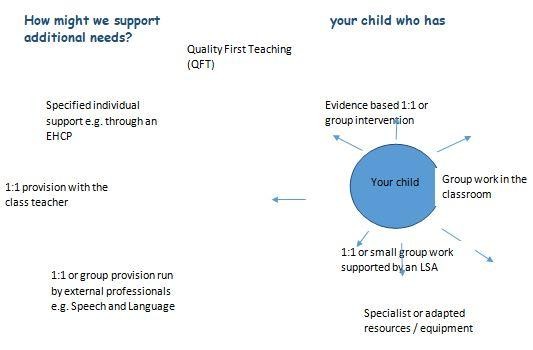Special Educational Needs and Disabilities
Information Report
At Wheatfields Primary School, we value every child individually. We recognise that all children are different and we celebrate their successes and strengths as well as providing them with support when they need it.
We aim to provide high standards of teaching and learning in an environment where each child is valued as an individual and encouraged to achieve his or her potential. We have high aspirations and expectations for all children. We want to support children to be confident, happy and successful. We believe this happens best when home and school work together.
This Information Report should provide you with clear and up to date information about SEND provision at Wheatfields Primary School. You can also see our SEND policy which is available on our website.
Who can I contact to discuss SEND at Wheatfields Primary School?
Our SENDCo is Mrs Probert, who is also one of our teachers.
Mrs Probert works part time as SENDCo on Mondays, Tuesdays and alternate Wednesdays.
You can make an appointment to see her by speaking to Miss Keane in the school office: 01480 466919.
The school SEND link Governors are Ms Elle Higgins and Ms Jacquie Woodcock, who can be contacted via the school office.
How is Wheatfields Primary School accessible to your child with SEND?
At Wheatfields we believe that all children should have access to a broad, balanced and relevant curriculum which is adapted to meet the needs of individuals. Extra-curricular activities including our after school clubs and on-site Kid’s Club are accessible for all children. This also includes school day trips and residentials.
What additional support services are available for children with SEND?
The school can access additional support services through the Local Authority. In order to access this support we may complete an EHA (Early Help Assessment) alongside the parents. The services we are able to access include:
• Educational Psychology Service
• Speech and Language Therapy
• School paediatrician
• School nurse
• Occupational Therapy
• Physiotherapy
• Specialist Teaching Team
• Social Care
• Child and Adolescent Mental Health (CAMH)
• Family workers from our locality team
How will the teaching and/or curriculum be adapted for my child with SEND?
Class teachers plan lessons according to the needs of their class. They adapt them where needed and make reasonable adjustments to ensure that the learning is accessible for all. Within each class, the teacher plans according to each child’s individual starting point to ensure that they are all successful learners and make progress appropriate to their level of need.
The SENDCo liaises regularly with the class teachers to offer advice on ways that lessons can be adapted to meet the range of needs within their class.
Children with identified or emerging needs will have their additional provision and the progress made towards their targets recorded on an APDR (Assess, Plan, Do, Review) cycle. These will be written and reviewed termly and shared with parents at these points. Parents will also be asked to contribute towards their child’s APDR.
How do the school measure the progress of my child?
Your child’s progress is continually monitored by the class teacher and is discussed formally at Pupil Progress Meetings with the Senior Leadership Team. Children’s progress is assessed over the year in order to track their learning. This informs next steps and where there may be need for additional support. More formal assessments may be used at various times throughout the year in order to identify gaps and adapt future planning accordingly
At the end of Key Stage 2 Year 6 children are required to sit Standard Assessment Tests (SATS) This is a statutory requirement set out by the Government and the results are published nationally.
The progress of children with an EHCP is formally reviewed at an Annual Review Meeting and may involve the other professionals that are part of your child’s care.
How are the teachers in school helped to work with children with Special Educational Needs or Disability and what training do they have?
The SENDCo’s job is to support the class teachers in ensuring that they meet the needs of SEND learners. Mrs Probert (SENDCo) has gained the qualification ‘National Award for Special Educational Needs Co-ordination’. As a staff, we share expertise and experience. Where training needs are identified, these may be addressed by individuals or the whole staff. Recently this has included whole school training on the use of APDRs (Assess, Plan, Do, Review), autism training and speech and language support.
What support do you have for parents of children with SEND?
The class teacher is regularly available to discuss your child’s progress or any concerns you may have and to share information about what is working well at home and school so similar strategies can be used. The SENDCo is also available to meet with you to discuss any questions you may have. A home-school contact book may be used to support communication with you, if this is agreed to be helpful.
At Wheatfields we are very fortunate to have our own SEMH lead (Social, Emotional, Mental Health). Mrs Parkinson-Rose (nee Cutbush) works closely with the children and their parents helping to signpost pupils and their families who require support. She may see pupils individually or in a small group for a short period e.g. 1 or 2 weeks, or for longer periods depending on the level of need.
How will the school prepare and support my child when they are joining Wheatfields or moving on to their next class or a different school?
We recognise that transitions can be difficult for a child with SEND and take steps to ensure that any transition is as smooth as possible.
a) If your child is moving to another school:
We will ensure that all relevant information is shared with the receiving school so that they can prepare in advance. Where possible a planning meeting will take place with the SENDCo and / or class teacher from the new school. If your child would be helped by a book / passport to support them in understanding moving on, then one will be made for them.
b) If your child is joining us from another school:
Your child will be able to visit our school and stay for a taster session, if this is appropriate. We will ensure that we speak to the previous school, if needed, so that we have all the information required.
c) When moving into the next year group:
Information will be passed on to the new teacher in advance of receiving the class in September. As well as data regarding the pupils’ progress, pastoral support information will be shared to ensure continuation of useful strategies.
d) In Year 6:
The Year 6 teachers will meet with the receiving Secondary School for transition meetings. During these meetings the needs of all pupils will be discussed, especially those with SEND. The Year 6 pupils will complete transition work to support their understanding of the changes ahead. Some pupils may have additional sessions as a small group or 1 to 1 with our SEMH lead or a member of support staff. Additional visits are available for those children who need them.
What is the Local Offer?
The local offer is a 'front door' to information from education, health and social care about the provision and services that are available for children and young people aged 0-25 with special educational needs and disabilities (SEND) and their families. The Local Authority (LA) is required to publish this information and keep it under continual review.
You can access the Local Offer here: www.cambridgeshire.gov.uk/SEND
The intention of the Local Offer is to improve choice and transparency for families. It is hoped that it will be a useful place for parents to understand the range of services and provision available to them in the local area.
How will the school let me know if they have concerns about my child’s learning and progress in school?
The progress of all our pupils is regularly monitored by class teachers and the Senior Leadership Team (SLT). This may be through formal assessment e.g. tests, or informal assessments e.g. observations. We use a range of evidence to inform us of how our pupils are progressing; this might include children’s work in their books, discussions during class time and responses to teachers marking. The progress of all pupils is reviewed termly in Pupil Progress Meetings where teachers discuss the progress and needs of all pupils in their class. When a pupil is identified as not making expected progress or a concern is raised by parents / carers then some of the following actions will be taken:
• the school will set up a meeting to discuss this with you in more detail
• plan any additional support your child may receive
• discuss with you any referrals to outside professionals to support your child’s learning
How can I let the school know if I am concerned about my child’s progress in school?
If you have concerns about your child’s progress you should speak to your child’s class teacher initially. If, following this, you still have concerns you should speak to the SENDCo (Mrs Probert) or the Headteacher (Mrs Verney-Davies).
Who are the best people to talk to at Wheatfields Primary School about my child’s difficulties with learning / Special Educational Needs or Disability (SEND)?
The class teacher has responsibility for:
- monitoring the progress of pupils in their class and identifying, planning, delivering and monitoring the outcomes of any additional support pupils may need e.g. small group work
- informing the SENCo of any additional provision they are delivering
- setting targets and smaller steps for identified pupils and sharing these with parents at least termly
- ensuring that all support staff working with pupils are kept well informed of their targets and individual needs, so that they can achieve the best possible progress
- ensuring that the schools SEN policy is implemented in the classroom
The Special Educational Needs Co-ordinator (SENDCo: Mrs Probert) has responsibility for:
- developing and reviewing the school’s SEND policy
- co-ordinating all the support for children with SEND
- liaising with other professionals who may be coming into school to help support your child e.g. speech and language therapists, Educational Psychologists, Specialist teachers, physiotherapists, social services
- supporting and advising class teachers and teaching assistants so that they can help children with SEND in our school to achieve the best progress possible
- updating the SEND register. This is a register which is kept to ensure all the SEND needs of pupils in our school are known. The four areas of need are cognition and learning; social, emotional and mental health difficulties; communication and interaction and sensory and/or physical needs
- suggesting appropriate learning programmes and interventions to meet your child’s specific needs
The Headteacher (Mrs Verney-Davies) has responsibility for:
- the day-today management of all aspects of the school, this includes the support for children with SEND
- the Headteacher will give responsibility to the SENCo and class teachers but is still responsible for ensuring that your child’s needs are met
- ensuring that the Governing Body is kept up to date with matters relating to SEND
The SEND Link Governors (Ms Higgins and Ms Woodcock) have responsibility for:
- liaising with the SENCo and Headteacher to ensure that they remain fully informed with regards to SEND provision and needs in school
- the listening to, responding to and working in partnership with the parents and school to resolve any issues brought to their attention by a parent which have not been resolved through previous discussions with school staff


